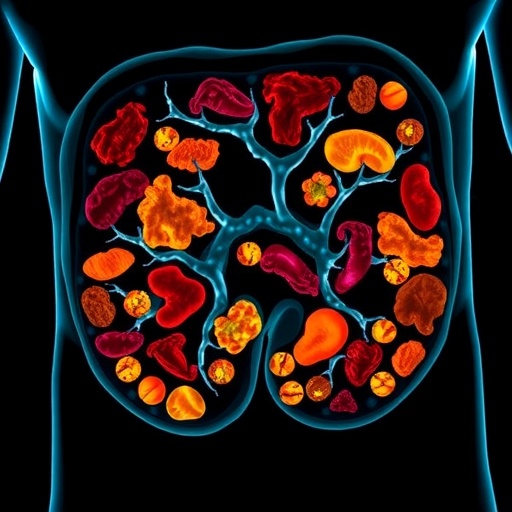In a groundbreaking study, researchers have investigated the multifaceted role of curcumin—a vibrant yellow pigment derived from the turmeric plant—in the battle against colon cancer metastasis. The study, published in the journal Scientific Natural, highlights how curcumin not only serves as an anti-inflammatory and antioxidant agent but also plays a crucial role in regulating the tumor microenvironment, thereby inhibiting the spread of cancer cells. This research opens new avenues for therapeutic strategies aimed at managing colon cancer, a leading cause of cancer-related deaths worldwide.
Colon cancer is notorious for its ability to metastasize or spread to other parts of the body, complicating treatment and severely affecting patient prognosis. The extracellular matrix (ECM), a complex network of proteins and carbohydrates, provides structural and biochemical support to surrounding cells, including tumor cells. Maintaining the stability of the ECM is crucial for preventing metastasis. The study by Wang et al. emphasizes the protective effects of curcumin on the ECM, suggesting that it could serve as a potent ally in halting tumor progression.
One of the most intriguing findings of this research is the identification of the HPSE/IL-6/STAT5 signaling axis as a pathway influenced by curcumin. Heparanase (HPSE) is an enzyme implicated in the degradation of the ECM, which, when activated, facilitates cancer cell migration and invasion. Curcumin appears to inhibit this pathway, suggesting it could limit the ability of cancer cells to escape their primary site and invade surrounding tissues. This represents a significant step forward in understanding how natural compounds may interfere with key processes involved in cancer metastasis.
Interleukin-6 (IL-6) is a pro-inflammatory cytokine that has been linked to various cancers, including colon cancer. Elevated levels of IL-6 contribute to a pro-tumor microenvironment that fosters cancer cell survival, proliferation, and migration. The study reveals that curcumin can effectively modulate IL-6 levels, thereby creating a less hospitable environment for cancer cells. This interaction highlights the essential link between inflammation and cancer progression, reinforcing the idea that anti-inflammatory strategies could be valuable in cancer treatment.
The STAT5 transcription factor is also pivotal in mediating the effects of IL-6 on tumor cells. By inhibiting the activation of STAT5, curcumin disrupts the signaling pathways that promote tumor growth and metastasis. This detail underscores the potential of curcumin as a dual-action agent that targets both the inflammatory and signaling components of cancer biology. Such multitarget strategies are becoming increasingly recognized as essential in developing effective cancer therapies.
Moreover, the study’s implications extend beyond curcumin’s direct effects on tumor cells. Curcumin also influences the stromal components of the tumor microenvironment, including fibroblasts and immune cells. By modulating these interactions, curcumin can alter how the tumor communicates with surrounding tissues, potentially enhancing the effectiveness of conventional therapies and improving overall patient outcomes. This aspect of curcumin’s action could lead to new combination therapies that integrate nutritional or herbal supplements with standard care protocols.
Importantly, this research adds scientific rigor to the longstanding tradition of using turmeric as a health supplement in various cultures. Traditionally recognized for its anti-inflammatory properties, curcumin is consumed in various forms—whether as a spice, in dietary supplements, or as an herbal remedy. The findings of Wang et al. provide a modern scientific basis for these traditional practices, suggesting thatdietary curcumin could be harnessed effectively in preventive strategies for colon cancer.
The featured study also prompts a comprehensive re-evaluation of the role of diet in cancer prevention. As the incidence of colorectal cancer continues to rise globally, understanding how dietary components affect cancer biology is vital. Curcumin’s protective properties could inspire dietary recommendations aimed at enhancing the intake of anti-cancer compounds, thereby fostering a proactive approach to health.
Critically, while these findings are promising, researchers stress the need for further clinical investigation. Human trials are essential to determine the appropriate dosages and delivery methods of curcumin for maximal therapeutic efficacy. Furthermore, understanding individual variations in metabolism and response to curcumin will be crucial. Future studies should focus on elucidating the mechanisms through which curcumin exerts its effects across diverse populations.
Finally, the attention drawn to curcumin puts a spotlight on the broader field of nutraceuticals and their potential role in oncology. As the paradigm shifts from conventional single-agent therapies to integrative approaches that consider diet and lifestyle, compounds like curcumin will likely play an essential role in shaping future cancer treatment protocols.
In summary, the study by Wang et al. solidifies curcumin’s position as a promising candidate for colon cancer treatment and prevention, emphasizing the importance of maintaining the extracellular matrix’s integrity while inhibiting pathways that facilitate cancer cell migration. As research continues to unfold, curcumin’s potential utility in improving clinical outcomes for patients with colon cancer bears significant promise for the future of cancer therapy.
Subject of Research: The protective effects of curcumin on the extracellular matrix and its role in inhibiting colon cancer metastasis through the HPSE/IL-6/STAT5 axis.
Article Title: Curcumin protects extracellular matrix to maintain microenvironmental stability inhibiting colon cancer metastasis through HPSE/IL-6/STAT5 axis.
Article References: Wang, X., Chai, R., Li, J. et al. Curcumin protects extracellular matrix to maintain microenvironmental stability inhibiting colon cancer metastasis through HPSE/IL-6/STAT5 axis. Sci Nat 112, 47 (2025). https://doi.org/10.1007/s00114-025-01988-y
Image Credits: AI Generated
DOI: https://doi.org/10.1007/s00114-025-01988-y
Keywords: Curcumin, colon cancer, metastasis, extracellular matrix, HPSE, IL-6, STAT5, anti-inflammatory, nutraceuticals, cancer therapy.
Tags: antioxidant effects of curcumincancer cell signaling pathwayscancer-related death causescolon cancer metastasis preventioncurcumin anti-inflammatory propertiesextracellular matrix stabilityheparanase enzyme roleHPSE IL-6 STAT5 axisinnovative cancer treatmentstherapeutic strategies for colon cancertumor microenvironment regulationturmeric plant benefits





